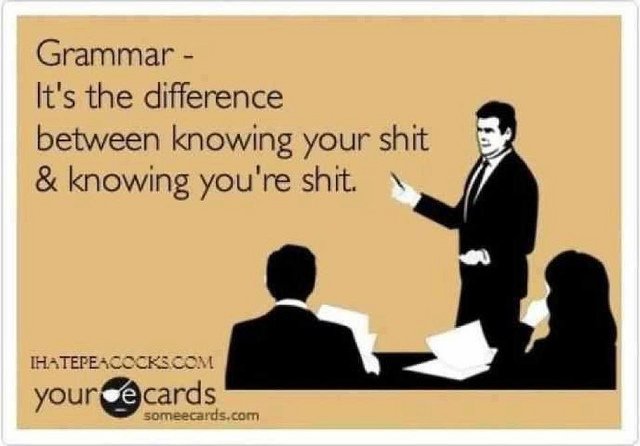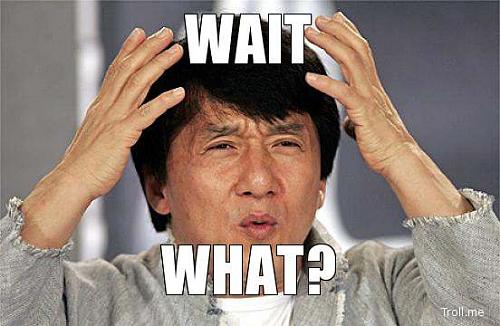Just some Funny Grammar Vids
This is too funny. Your Grammar Sucks (YGS) youtube channel is the black hole I dedicate so many hours of giggles to. Have fun.
This is too funny. Your Grammar Sucks (YGS) youtube channel is the black hole I dedicate so many hours of giggles to. Have fun.

I love that meme, it’s the shit.
Anyways, I just wanted to point out some very interesting points of discussion both of my groups brought up in class today. The first being basic grammar skills and lessons. We discussed that most of us were given the basic roundabout grammar generalizations somewhere between elementary and middle school. Where we got the “this is a noun, and this is a verb” impeccable knowledge implementation. Whoo! Now we’re all on the same page. But we couldn’t seem to agree on whether or not grammar lessons were crucial to good writing. Someone even mentioned that in their article it said that according to studies, it had no noticeable effect on students ability to write clearly. Which only makes me wonder, is it as crucial as learning cursive?
The second, was a point that I found to be very interesting in my article, “The Phenomenology of Error” by Joseph M. Williams. This was the idea a researcher had which required readers to only report on errors they noticed in a first reading. Which we then discussed as a group and came to a conclusion that the first reading, to anyone other than a teacher, is the most crucial and somehow also the most forgiving. This is, because most writing outside the academic realm, which is what most teachers dream their students will aspire to, is seen in newspapers and magazines and so on. Therefore, unless the piece is being used for an academic resource, the reader will likely only read the material once, which means the author only gets one chance to make a strong case and a good impression. Therefore, the first reading only really accounts for content, not mechanical errors. So if it’s readable, it’s doable. But, where do we draw the line? What is not doable? How bad does it have to be? Oh, that’s a scary thought.
The final point we covered was how grammar tends to hold more meaning than mechanics. We talked about how many young writers are shamed for “writing the way they talk” when more often than not, talking out a problem creates a much clearer argument and solution, than just putting pen to paper. I’ll be the first to admit I write exactly the way I speak. Which lead us directly into the practice of what we deemed “mock writing.” Where students are given, or choose, an author of merit to annotate, analyze, and recreate and how practice in this manner is much more effective than blah blah blah rules!
Ok, I lied, we discussed one more very interesting point. That of which a tutor in the ESL tutoring center noted to be pretty interesting. They discovered that, interestingly enough, often times when a student of another first language is being critiqued on a “grammar mistake” they are, in fact, often correct. And we attributed this to the fact that English learners tend to learn “from the book,” where as native speakers learn from culture and experience. So a grammar mistake we native speakers might catch, could be an existing “rule” someone created long ago, and this new learner is simply abiding by. There is no answer to who is correct here, its just an interesting thought that and English learner may actually be “better at this” than we native speakers are.
Just some food for thought folks.

This will be really short…
I over think everything, my essays, my written responses, my topics of discussions, and especially especially ESPECIALLY what I say out-loud in class. And then even when I do say what I went over in my head a thousand times I still turn beat red as if I said something stupid or maybe even stuttered. So in a sense I love the Maria’s because they take the pressure off of me to feel the need to say anything at all. But at the same time when I raise my hand because I feel really passionate about the topic of discussion and some dude is rambling off about how he thinks it relates to some comic, I lose either my patients with how long I’ve been waiting, or finally realize just how stupid and redundant what I was going to say was. And I put my hand down and start doodling in irritation with both myself and the class Maria. I have no clue how to solve a problem like Maria. Because it’s just stupid to discourage any student from talking, but how can we somewhat hush them to bring forth a wider range of questions in the class.

It hit me like a freight train. This idea that without assigned academic writing in any given course we are all mere tourists. We are given an overview of what we are supposed to learn, but get this, never actually learn it. Take myself for example, I super suck at math, hence my chosen major. I have always sucked at anything mathematical until I reached college. I took a theories of mathematical thought course, where we had to answer a whole lot of questions that any math scholar would have deemed trivial, but to someone like myself, the questions were designed to create more questions, which in turn lit a fire under my booty to go out and find those answers for myself. I had a pure sense of my own curiosity in the field of math (blehh!) that I had never had or conceived I would have. And at the end of the day I was asking my own questions from my own interest, not regurgitating answers from questions designed by the lecture, or furthermore, what the teacher thought I should be curious about.